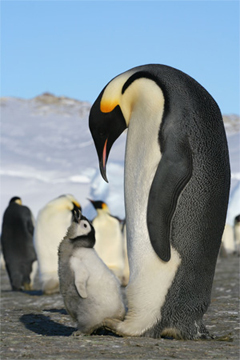|
|
Disappearing sea ice around Antarctica may put emperor penguins at risk of extinction within the next century, warn scientists writing in this week’s Proceedings of the National Academy of Sciences.
Combining population data from the Terre Adelie emperor penguin colony of eastern Antarctica from 1962-2005 and sea ice projections based on the latest IPCC Fourth Assessment Report, Hal Caswell and colleagues found a 36 percent likelihood of a 95 percent or more population decline by the year 2100. Emperor penguins are already suffering from warming, which has reduced the availability of prey and may have contributed to a halving of the colony size since the 1970s, but the new research focuses on changes in their habitat: sea ice. Emperor penguins are dependent on sea ice for breeding, feeding, and molting.
“Sea ice is a key breeding and feeding habitat for emperor penguins,” write the authors. “Colonies are formed on sea ice many kilometers from the open sea, and breeding emperors make foraging trips between the colony and areas of open water during the entire incubation and chick rearing periods.”
 Emperor penguin with chick. Photo courtesy of Samuel Blanc. |
“Absence of, or early break-up of, the winter sea ice holding up the colony may cause low breeding success. Sea ice extent during winter also affects the abundance of prey for emperor penguins. Winters with extensive sea ice enhance krill abundance, and emperor penguins mainly feed on fish species that depend on krill and other crustaceans. In accordance with this, years with reduced sea ice extent coincide with reduced adult survival rates.”
Large-scale loss of sea ice will impair the ability of emperor penguins to survive in eastern Antarctica and the birds will have to adapt “by arriving at the breeding colony earlier, laying eggs earlier, or migrating” to avoid extinction. The researchers caution that while “Antarctic bird species that have altered their life cycles, emperor penguins have historically seemed slow to change”.
“Given the future projected increases in greenhouse gases and its effect on Antarctic climate, evolution or migration seem unlikely for such long lived species at the remote southern end of the Earth,” they write.
CITATION: Stephanie Jenouvrier, Hal Caswell, Christophe Barbraud, Marika Holland, Julienne Stroeve, and Henri Weimerskirch. Demographic models and IPCC climate projections
predict the decline of an emperor penguin population. PNAS Early Edition for the week of January 26, 2009. www.pnas.orgcgidoi10.1073pnas.0806638106